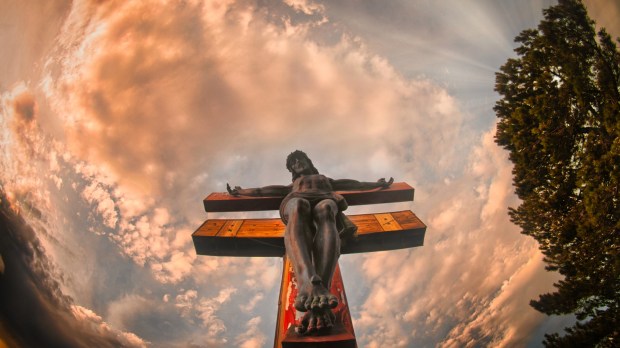Here we are at Christmas, and Jesus has come as a little baby. We make a grave mistake, though, if we think that just because he looks small we can fit him snugly into our lives (it’s four mistakes, actually).
And as much as I love the heart-warming sweetness of Christmas, I fear it too often obscures the central meaning of this day, because the true meaning of Christmas is so overwhelming its almost uninviting: Jesus came to make us into him.
First, let’s acknowledge the fact that this makes us uncomfortable. It should.
St. Paul said it over and over:
- “It is no longer I who live, but Christ who lives in me,” he told the Galatians
- “For me, to live is Christ,” the told the Philippians.
- The old us “died” and our lives now are “hidden with Christ in God,” he told the Colossians.
But we may have let these phrases become too familiar. For this to hit as hard as it should, listen to Blessed Columba Marmion say the same thing in modern language:
“Never forget this truth: the Eternal Father is pleased with us only in so far as we imitate his Son and inasmuch as he sees in us the likeness of his Son.”
Let that sink in. Paul meant it: God wants to look at us and see Jesus.
But, second, it’s important to stress right away that it is not a clone army that God wants.
“Life in Christ” can raise an unsettling picture in our mind of losing our personalities in a cult. But in the actual life of the Church, saints come in all shapes and sizes, including yours. For starters, compare St. Paul, the fiery world traveler and Columba Marmion, the stay-at-home monk. They shared the same goal, but ended in very different places.
As Pope Benedict put it: “If we let Christ into our lives, we lose nothing, nothing, absolutely nothing of what makes life free, beautiful, and great.”
Third: Christmas shows us what “life in Christ” means by showing us Jesus’ humanity.
By becoming a baby, Jesus reveals his whole plan for our lives.
- Seeing him, we know what to do: An infant has no voice, so we have to speak for him; an infant can’t walk, so we have to bring him to others.
- His manger shows us what to value: By becoming a refugee child he shows us to seek God’s protection, not worldly power; and family love, not material possessions.
- And Jesus in the manger needs all Seven Works of Mercy: he needs to be housed, fed, given drink and clothed; he is visited like a sick person or prisoner; and he is even prepared for burial, with myrrh.
Thus, at Christmas, Jesus shows us how he serves in us and how we serve him in others.
Fourth: Jesus’ divinity at Christmas shows what God intends for us.
The Fathers of the Church saw the meaning of Christmas clearly, but their formulation of it has been so long forgotten that it now seems scandalous: “He was made man that we might be made God,” wrote Athanasius.
This shouldn’t surprise us, though. When he created us, God said, “Let us make man in our image, after our likeness; and let them have dominion.” And our first pope, Peter said that the point of the Church, with its baptism and Eucharist, is to make us “partakers of the divine nature.”
That’s a great way to put it. We are not God, but in Christ we share what is his.
Fifth, Jesus, visited by angels, show us where our true home lies.
Jesus comes to us clearly as a sojourner, in the world but not of it — belonging to another realm filled with angels, not to ours where we rarely see them. This also reveals the place we are destined for.
“It does not yet appear what we shall be, but we know that when he appears we shall be like him, for we shall see him as he is,” St. John’s first letter says.
Christ will “transform our lowly body to be like his glorious body,” St. Paul told the Philippians.
After a life spent living Christ’s life, we will look like him one day, too.
That’s the real meaning of Christmas.

